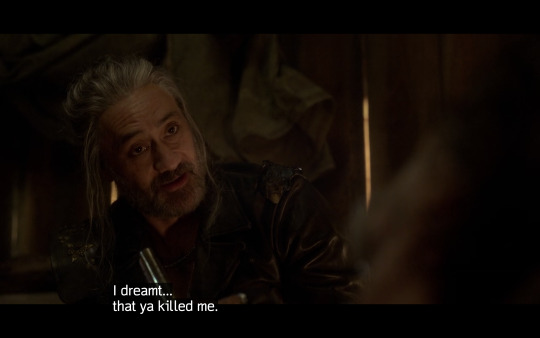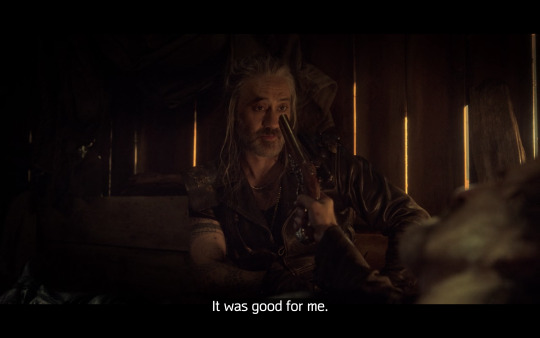#in order to obscure the fact that he is also too afraid to kill ed
Text



So I've only watched 2.1, 2.2., and 2.3 once each so far, but I can already tell the music choices are going to wreck me this season. I figure lots of people will have things to say about the use of Kate Bush in 2.3, so I want to focus on the second movement of Beethoven's Symphony #7 in 2.2, "Red Flags."
First, this movement has been a banger since it existed: at its first performance, the audience demanded that the second movement be repeated after the symphony concluded. It's a funeral march, and per the notes accompanying the Deutsche Kammerphilharmonie of Bremen's gorgeous recording, it was likely heard as responding to collective grief:
The premiere performance of Beethoven's Seventh was at a benefit concert in Vienna in December 1813 for wounded soldiers and their families. It came only two months after the Battle of Nations near Leipzig. The German name is "Völkerschlacht" (Slaughter of the Peoples), one of the most catastrophic wartime events in human history. It also marked the liberation from Napoleon's forces. The sad, beautiful quality of this piece makes it very different from the other three movements of Beethoven's Seventh. Endlessly mournful – but also uplifting, it is still played at funerals today.
For those of us who were in music school at a certain point in history, it is also the soundtrack for characters experiencing suicidal ideation, courtesy of the 1994 film Immortal Beloved.
Its use underpinning the conversation between Ed and Izzy is self-explanatory: Ed's way of expressing self-loathing is to goad the people around him to hurt him. He feels a kind of ambivalence toward his own life that we saw last in OFMD's pilot, where Stede cannot firmly answer Oluwande's question, "Do you want to live?!"
But we hear the first notes of Beethoven before that scene ever begins.


That the music begins here, rather than when Ed enters the hold to press Izzy into killing him, highlights as much as anything we've seen so far how traumatized Lucius is: not just by being pushed overboard, but by all the trafficking and abuse he experienced before encountering his former crewmates, which he barely starts to detail in this episode. "If I start, I don't know what's going to come out." The stories Lucius shares may have an over-the-top quality, but they're scored like tragedy.
#tw suicidality#i have a lot to say about izzy taunting ed for being too afraid to kill himself#in order to obscure the fact that he is also too afraid to kill ed#and that it's not a matter of principle#and that yes ed is bloody well scared and miserable#and that part of what he needed was permission to feel those emotions#and maybe also that in some way he feels like his life ended when he tried to commit to being blackbeard instead of ed#but there might be other times for that#edward teach#izzy hands#lucius spriggs#ofmd#our flag means death#ofmd s2 spoilers#beethoven
67 notes
·
View notes
Text
The New Paranoia: Trump’s election has turned the left into a breeding ground for conspiracy theories.
The New Republic Kindle Edition, 2017 © The New Republic
Colin Dickey Late on Election Night in 2012, the nation watched as Karl Rove panicked on live television. Fox News, his post–Bush administration sinecure, had just called Ohio—and, by extension, the country—for Barack Obama. While the network broadcast images of jubilant crowds in Chicago, Rove refused to concede. “This is premature,”he insisted, ticking off various precinct figures from Ohio counties and warning that everyone needed to be “very cautious about intruding into this process.”For an embarrassingly long half-hour, Rove argued with the entire network, demanding that Fox retract its call on Ohio, to no avail. What did Karl Rove know that no one else did? Why was he so certain that the numbers from Ohio were wrong? The left-wing web site Truthout thought it had the answer. A few days after the election, the site published an article asserting that Rove had been working behind the scenes to rig Ohio’s electronic voting machines, monkeying with the software to tilt the count to Mitt Romney, as part of a conspiracy to rob Barack Obama of a second term. He’d done this before, the site charged, back in 2004, to assure Bush’s reelection. That’s why Rove appeared “genuinely shocked”when Obama took Ohio, “because he knew the fix was in, just like in 2004, and there was no way President Obama was going to win reelection.”So why hadn’t Rove’s ratfucking scheme worked? Because, Truthout claimed, the hacker collective Anonymous had learned of his conspiracy, and had secretly out-ratfucked the ratfucker. Citing a YouTube video released before the election, Truthout described how Anonymous had warned Rove not to act: “We want you to know that we are watching you, waiting for you to make this mistake of thinking you can rig this election to your favor.”Truthout, if correct, suggested an awful truth about our political system: A shadowy organization of superhackers was the only thing standing between us and a stolen election. For the most part, this kind of conspiracy theory—the idea that sinister forces are secretly engaged in a host of elaborate plots to manipulate virtually every aspect of our lives—has been fairly rare on the American left. Sure, liberal nut jobs have engaged in all kinds of far-fetched theories over the years, wild ideas about the Trilateral Commission and the JFK assassination, that the government created AIDS to destroy the black community, or that George W. Bush had advance warning of the terrorist attacks on September 11. But most of these theories have remained cordoned off from mainstream media; the Truthout story, for example, never circulated much beyond a few fringe web sites. The left has generally presented itself as the sober, rational half of our political discourse, eschewing paranoid fables and histrionic bloviaters in favor of reputable, fact-checked reporting. The right, on the other hand, has not only incubated conspiracy theories, it has thrived on them, become dependent on them, built entire media ecosystems and political careers around them. Glenn Beck, at his peak, commanded a daily television audience of more than three million viewers by arguing that the Obama administration had secret plans to implement a Second Bill of Rights, that the Arab Spring was the beginning of a worldwide Muslim caliphate, and that Woodrow Wilson and Teddy Roosevelt orchestrated a 100-year conspiracy to establish a “socialist utopia”in America. Alex Jones, the founder of Infowars, has become an influential voice on the right by insisting that the Sandy Hook massacre was a government-led false flag operation to implement gun control, that same-sex marriage stems from a “eugenicist-globalist”worldview, and that Hillary Clinton and John Podesta ran a child sex–trafficking ring out of a pizza parlor in Washington, D.C. None of this stopped Donald Trump from calling Jones for advice and appearing on his show. After all, the two men helped promulgate what is perhaps the right’s most influential conspiracy theory—that Barack Obama was born in Kenya, a racist fantasia that launched Trump’s political career and helped land him the presidency. But since the election of the Birther-in-Chief, both the nature and the source of conspiracy theories has shifted dramatically. In recent months, the left has begun to rival Trump himself as an incubator for sinister musings and crackpot accusations. And like Trump, left-wing conspiracists are using Twitter to gestate and market-test their most outlandish forms of political insanity. Leading the charge has been Louise Mensch, a British former MP who seemingly overnight has become the main spokesperson of the paranoid resistance. Mensch has attracted more than 284,000 followers on Twitter, legitimate journalists among them, by posing ever more elaborate and ludicrous theories of the Russian conspiracy to elect Trump. She claims, for example, that Andrew Breitbart was assassinated by Russian agents to allow for the ascendancy of Steve Bannon, who took over the Breitbart web site after its founder’s death in 2012. Anthony Weiner’s sex scandal with a minor was, likewise, the work of Russian intelligence: Mensch claims that they invented a fake profile for a 15-year-old girl to entrap Weiner, planted files containing Hillary Clinton’s emails on his computer, and leaked the existence of those files to the FBI. Another left-wing node of conspiratorial diffusion can be found at The Palmer Report, a once relatively obscure pro-Hillary blog that has built a large following with its wildly speculative theories about Trump. According to the site, Trump himself had Russian agent Sergei Mikhailov killed in December to prevent the release of the now infamous “pee tape”that purportedly shows the president-elect urinating on a bed the Obamas slept in. Vladimir Putin, the site maintains, is using the video to blackmail Trump—and the president “may have already acted on it in a manner which would be both treasonous and murderous.”The site’s founder, Bill Palmer, routinely blasts out stories that sound serious but are actually based on a single, unverified source. In May, Palmer reported that Supreme Court Chief Justice John Roberts had ordered Trump appointee Neil Gorsuch to recuse himself from all Trump-related Russia hearings. His source? A single tweet from an anonymous Twitter account under the name “Puesto Loco.”Long quarantined in the furthest corners of the internet, these left-wing rantings have begun to find their way into mainstream political discourse. In March, Louise Mensch was inexplicably given space on the New York Times op-ed page to trumpet her theories, rattling off a list of Russian operatives she believed should be called to testify before Congress—a list that included Peter Thiel and Mark Zuckerberg. Her tally of agents has since expanded to encompass everyone from Black Lives Matter to Sean Hannity to Bernie Sanders. In April, MSNBC’s Laurence O’Donnell echoed a Palmer Report theory that Syria’s chemical weapon attack had been orchestrated by the Russian government, so that Trump could appear to distance himself from Putin. (Like a true conspiracy theorist, O’Donnell offered no proof for the claim, insisting instead that “you won’t hear … proof that the scenario I’ve just outlined is impossible.”) On Twitter, the Democratic Party’s deputy communications director retweeted Mensch’s unsubstantiated hypothesis that Russia had some form of blackmail on Representative Jason Chaffetz, chairman of the House Oversight Committee, who has since announced that he would resign. On May 10, Senator Ed Markey told CNN that “a grand jury has been empaneled up in New York”to investigate Russian meddling in the election; pressed by The Guardian, Markey’s staff said he got the information from Mensch and The Palmer Report. (A later press release claimed he’d received it from a “briefing”that was “not substantiated.”) When Ned Price, a former spokesman for the National Security Council, was asked why he retweeted a Palmer Report story, he insisted that a retweet was not an endorsement, but professed an openness to conspiracy theories. “Every once in a blue moon,”he said, “the tin hat can fit.”Why has Trump’s election driven the left to embrace such transparent nonsense? Part of the reason lies in the public’s loss of faith in the mainstream media, which predicted an all-but-certain victory for Hillary Clinton. Part of the reason also lies in Trump’s willingness to lie in direct contradiction of the known facts, an extension of the right’s long-running assault on the very notion of objective, verifiable truth. But above all, conspiracy thinking has gained traction among liberals for a more prosaic reason: Liberals are human beings, and human beings get rattled when they’re afraid. If the left is succumbing to conspiracy theories, it’s because conspiracy theories are a way to manage anxiety. Conventional wisdom has long held that there would never be a left-wing rival to Glenn Beck or Alex Jones, because liberals are just too damn smart to fall for that kind of stuff. “We believe in subtlety,”Mario Cuomo once explained. “We believe in telling the whole truth. We don’t want to exaggerate. Look, they write their message with crayons. We use fine-point quills.”As it turns out, though, the left wasn’t smarter than the right; it simply wasn’t terrified enough. Waking up to a country run by a man who openly boasts of sexual assault, who has systematically targeted immigrants and Muslims for deportation, whose every utterance seems to bespeak some form of mental instability, liberals suddenly find themselves adrift in a world they never imagined possible. In a landscape this dystopian, conspiracy offers a salve. It promises an order behind the madness, some sort of rational explanation for the seeming chaos. It validates your paranoia, which paradoxically confirms you’re not paranoid. And most dangerous of all, it affirms your sense that things are hopeless, while absolving you from having to do anything about it. Conspiracy theories may temporarily allay our fear, but they ultimately exacerbate the very conditions that created that fear in the first place. If there’s an aesthetic hallmark of this brave new world of left-wing conspiracy theorists, it’s the long, connect-the-dots Twitter thread. The purest and most overelaborated example of this new genre of paranoia debuted on December 11, with the publication of an unreadable, 127-tweet thread known as “Time for Some Game Theory.”Written by Eric Garland, a previously obscure figure who describes himself as a “futurist, keynote speaker, author, intelligence analyst, columnist, and bassist,”the thread veers between the sort of groundless conjecture and outright gibberish that form the basis of President Trump’s own late-night Twitter epistles. (“The Russians f**king rule at covert shit,”reads one Garland tweet. “Always have. Ask a cold warrior. Mucho respect for our adversaries. They do clever work!”) Yet “game theory”thread spread through the internet like measles in an undervaccinated population, garnering widespread praise and driving Garland’s following from 5,000 to 30,000 overnight. Garland’s thread depicts how the Russians, reduced by the end of the Cold War to “Drunk Uncle status,”systematically used everything from George W. Bush’s recklessness in Iraq to Edward Snowden’s revelations about the NSA to undermine confidence in the U.S. intelligence community. “DID YOU KNOW YOUR TOASTER IS SPYING ON YOU?”Garland tweeted, parodying the mind-set of an American duped by the diabolical Russian conspiracy. “THE GUBMINT! IT IS EVERYWHERE! THEY SPY ON (*controls snickering*) ALLIES! ALL BAD!”According to Garland, Russia’s long con led directly to our current political predicament: “Trump says he don’t need no stinkin’intel agencies. Russia (BWA HAHAHAHAAAA) blames Ukraine! LOLOLOLOLZZZ.”The only way forward, Garland concludes, is to embrace his “game theory”in all its intricate zaniness. “To be American,”he tweets, “is to accept that unflinchingly and to soldier forth for future generations, and DO BETTER, GODDAMN IT.”Other Twitter-threaders were quick to follow in Garland’s paranoid footsteps. Adam Khan, a Silicon Valley marketing consultant, linked to a report about a Treasury Department probe into real estate deals in Miami and New York, which noted that shell companies making all-cash offers sometimes serve as fronts for corrupt officials or drug smugglers. This is an important moment for the left. If we give credence to the wild fantasies spreading virally through Twitter, we open ourselves up to further infection by a new generation of liberal birthers and truthers. What’s worse, believing in conspiracy also makes us less likely to take action: In one study, participants who were shown a video claiming that global warming was a hoax were less likely to believe scientific studies about climate change or sign a petition to reduce carbon emissions. “Exposing the public to conspiratorial thoughts about a specific issue”—no matter how briefly, the researchers concluded—“may even decrease general pro-social tendencies.”Conspiracy theories, for all their crazy whiteboards and doomsday mentality, make the world seem simpler—and in doing so, they urge us to reject the hard work of organizing and activism, of knocking on doors and registering voters, of staying informed and showing up to town halls, of participating in local and state government, of reestablishing the basic principles of electoral politics that are so desperately in peril. The promise of conspiracy—that it will assuage our anxiety—is a false one. Watching Donald Trump from the social media sidelines, expecting at any minute that the Deep State will appear and fire a single magic bullet from the Grassy Knoll and put everything right again, is a dangerous delusion. It offers false assurance that you, as one lone individual, can’t do anything, even though American democracy has never needed you more.
0 notes